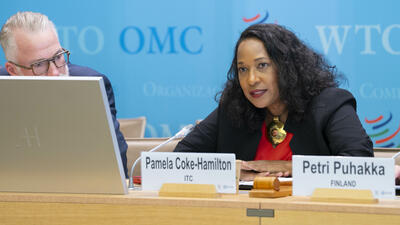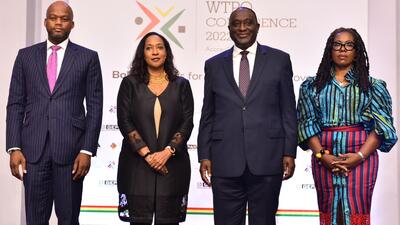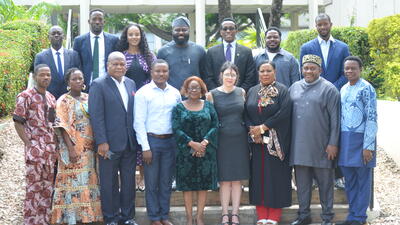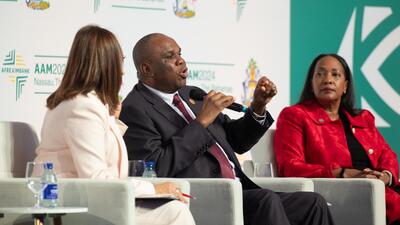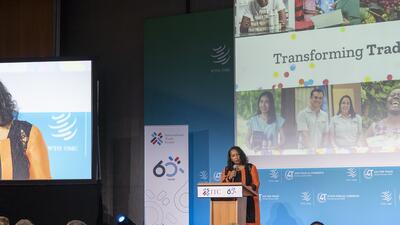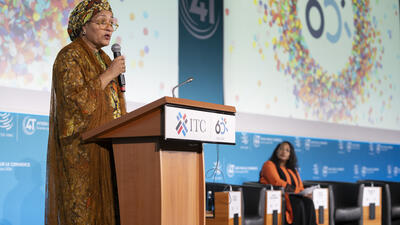
ITC Executive Director remarks on transport and the AfCFTA at the Global Africa Business Initiative
Greetings, ladies and gentlemen. I’m excited to be with you today for a conversation about how transport is crucial for realizing the full potential of the African Continental Free Trade Area, especially for small businesses.
We’re now approaching the end of the AfCFTA’s third year of trading. This is an exciting milestone for an agreement that is reshaping how trade works throughout the African continent. But if we want this agreement to deliver a truly integrated continental market—one that could boost Africa’s income by $450 billion by 2035, while raising the region’s exports by over 81 percent—we have to talk about small businesses and the hurdles they face, especially when it comes to transport.
Micro, small, and medium-sized enterprises make up over 90 percent of businesses throughout the African continent and are the source of over 80 percent of the region’s jobs. We have to prioritize their needs if we want the AfCFTA to succeed. But small businesses face notable difficulties getting their goods across borders, especially with poor or inaccessible transport infrastructure, limited transport services, onerous non-tariff measures, poor logistics, extensive red tape at the border, and a host of other challenges.
For instance, in francophone Africa, four out of 10 firms that we surveyed told us that transport—as well as logistics—imposes a hefty financial burden when they engage in intra-African trade.
The AfCFTA itself is a big step towards solving these problems. The United Nations Economic Commission for Africa estimates that the AfCFTA can boost intra-African trade in transport services by roughly 50 percent, including across road, rail, air, and maritime transport. But these gains won’t be realized without ramping up investments in transport infrastructure and services.
At the ITC, we designed our One Trade Africa programme to ensure that small businesses, especially those led by women and youth entrepreneurs, can reap the benefits of the AfCFTA—and can themselves contribute to helping this landmark trade agreement reach its full potential. This programme’s work includes a strong focus on transport infrastructure and services.
We’ve been working directly with the AfCFTA secretariat, the African Union Commission, and other partners in the continent to make this happen. For instance, we’ve recently worked with the AfCFTA secretariat to map out the private sector’s competitiveness challenges and opportunities. The process gave us invaluable insights into what these transport difficulties look like in practice: we learned, for instance, that nearly 40 percent of the non-tariff measures that businesses in Niger face in the transport sector pose challenges not for being NTMs themselves, but because of the burdensome processes these involve.
There’s a lot of work that remains to change today’s transport bottlenecks into tomorrow’s transport opportunities, but we’re already seeing some big pan-African steps towards making this goal a reality. This is largely thanks to the work undertaken by the African Union and the AfCFTA secretariat themselves to make transport services and infrastructure a priority, and we are grateful to be able to support them in these efforts.
For instance, the AfCFTA secretariat has identified transport and logistics services as among their priority value chains, while African Union member states have identified transport services as one of the five priority services sectors for liberalization. Transport services are an example of what we call at ITC “connected services”—those that can serve as catalysts for economic growth across a host of sectors, beyond their own, and that can especially benefit MSMEs, women, and youth.
The AU’s own Action Plan for Boosting Intra-African Trade—known in trade circles as BIAT—also identifies trade-related infrastructure as one of its priority clusters.
As we look to the future, we need the public and private sectors to work together to provide the investments needed for leveraging the full potential of transport services and infrastructure throughout the African continent. The AfCFTA’s own recently concluded investment protocol can help unlock crucial infrastructure investments, given its focus on promoting, facilitating, and protecting transboundary investments.
We have other policy instruments also at our disposal that, if used to their full potential, can help small businesses overcome transport-related challenges. Among these are the AfCFTA services protocol, with its potential to boost the competitiveness of transport services and, in turn, make it easier and quicker for small businesses to get their exports to market.
Before I close, I want you to also consider the gender dimension of transport-related challenges. We must hear from women businesses in Africa on what transport means for them and what they’d like to see happen as the AfCFTA evolves. Our SheTrades AfCFTA project has worked with over 100 women business associations throughout the continent. They’ll soon have an exciting update about a network bringing these associations together and marshalling their ideas into feedback for the policy community and the wider world.
Now, I want to hear from you. I want your ideas for how we can galvanize the public and private sectors to leverage the full potential of the AfCFTA, especially for the small businesses who hold the key to the region’s growth, jobs, and sustainable development possibilities.
Thank you and I look forward to our discussion.




